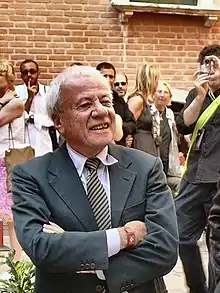Achille Bonito Oliva
Achille Bonito Oliva (born 1939) is an Italian art critic and historian of contemporary art. Since 1968 he has taught history of contemporary art at La Sapienza, the university of Rome. He has written extensively on contemporary art and contemporary artists; he originated the term Transavanguardia to describe the new direction taken in the late 1970s by artists such as Sandro Chia, Francesco Clemente, Enzo Cucchi, Nicola De Maria, and Mimmo Paladino.[1] He has organised or curated numerous contemporary art events and exhibitions; in 1993 he was artistic director of the Biennale di Venezia.
Achille Bonito Oliva | |
|---|---|
 | |
| Born | 1939 |
| Nationality | Italian |
| Occupation | art critic, art historian |
Life and career
Bonito Oliva was born in 1939 in Caggiano, in the province of Salerno, in Campania in southern Italy. He studied law, and then took a degree in letters. He took part in events connected with the avant-garde Gruppo 63 literary movement of the 1960s.[2]
In 1968 he began teaching history of contemporary art at La Sapienza, the university of Rome.[2]
He became active as an art critic, as a writer on history of art – with work on Mannerism, the historic Avant-Garde movements, and the Neo-Avantgarde – and as an organiser and curator of contemporary art events and exhibitions.[2]
Bonito Oliva has curated thematic and interdisciplinary exhibitions, including "Contemporanea" (Villa Borghese, Rome, 1974), "Aperto 1980" (together with Harald Szeemann, Venice Biennale, 1980), "Avanguardia Transavanguardia" (Mura Aureliane, Rome, 1982), "'Mythe, Drame, Tragedie", Musée d'Art et d'Industrie, Paris (1982), "Art and Depression" (Museo Correr, Venice, 1984), and "Minimalia" (P.S.1 Contemporary Art Center, New York, 1998). He directed the 45th Venice Biennale (1993), the 3rd Dakar Biennale (1998), the 1st Valencia Biennale (2001), and was the curator of the Italian Pavilion at the 7th Paris Biennale (1971). He has been awarded several prizes and recognitions, including the Valentino d’Oro, an international prize for art critics, in 1991.
In 1978 Bonito Oliva coined the term Transavanguardia to describe the Italian version of Neo-Expressionism, an art movement that rejected conceptual art, re-introducing emotions ― especially joy ― back into drawing, painting and sculpture. The artists revived figurative art and symbolism. The principal Transavanguardia artists were Sandro Chia, Francesco Clemente, Enzo Cucchi, Nicola De Maria and Mimmo Paladino.
Bonito Oliva has written many books and authored monographs on the work of artists such as Marina Abramovic, Francis Bacon, Georg Baselitz, Joseph Beuys, Alighiero Boetti, James Lee Byars, Giorgio de Chirico, Braco Dimitrijević, Marcel Duchamp, Giuseppe Ducrot, Alex Katz, Georgia O'Keeffe, Frida Kahlo, Paul Klee, Nam June Paik, Joan Mirò, Pino Pascali, Jackson Pollock, Robert Rauschenberg, Mario Schifano, Nancy Spero, Andy Warhol, Wolf Vostell,[3] and Robert Wilson.
Books
- Installation & Performance Art, Photology, Milan, 2007.
- White and Other in Any Case, Art, Allemandi, Turin, 2006.
- Art Tribes, Skira, Milan, 2002.
- Ubi Fluxus Ibi Motus, 1990-1962, Mazzotta, Milan, 2002.
- Travelers Without Baggage, Charta, Milan, 2000.
- American Graffiti, Art Books, Rome, 1997.
- Super Art, Politi Editore, Milan, 1992.
- Antipatia, Feltrinelli, Milan, 1987.
- Italian Transavantgarde, Politi Editore, Milan, 1978.
- Europe/America: The Different Avant-Gardes, Deco Press, London, 1976.
- The Ideology of the Traitor: Art, Manner and Mannerism, Feltrinelli, Milan, 1976.
References
| Wikimedia Commons has media related to Achille Bonito Oliva. |
- https://www.flashartonline.com/article/the-italian-trans-avantgarde/
- Bonito Oliva, Achille (in Italian). Enciclopedie on line. Rome: Istituto dell'Enciclopedia Italiana. Accessed September 2017.
- Gewalttätigkeit als objet trouvé. Retrospektive Wolf Vostell 1958–1974. Neue Nationalgalerie Berlin, Berlin, 1974.